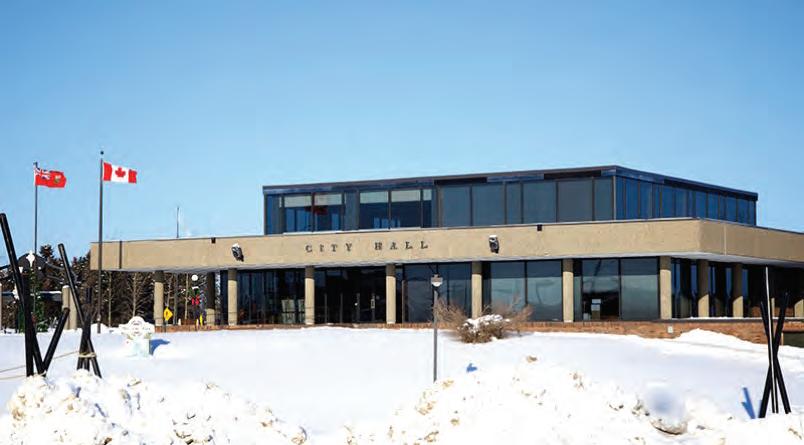
17 minute read
Westwood • 2 Burntwood
from February 2 2022
Volume 58 Number 11 Friday, March 16, 2018
Thompson, Manitoba Nickel Belt News
Advertisement



Wednesday, February 2, 2022
Serving the Norman Region since 1961
Serving the Hub of the North since 1960

Providing you with expert advice & friendly service.
Book online at speedyglass.ca or try our free app on your iPhone We look forward to serving you.
-A Kelsey Bay Thompson, MB R N S Ph: - - Fax: - -
Volume 62 • Issue 05
New bylaw would change committee structure, eliminate community feedback section of council meetings
Vale gives city $125K to buy asset management software

BY IAN GRAHAM
EDITOR@THOMPSONCITIZEN.NET Book a way to preserve and pass on Thompson city council approved first reading of a new organizational and procedural bylaw by a vote of 5-3 at a special meeting memories of growing up in ChurchillJan. 27. If passed, the new bylaw will replace two existing bylaws – one organizational and one procedural – in place since 2020.
The main change in the new bylaw is that standing committees, although they can still be established if council wishes, will be replaced by committee of the whole meetings twice a month, on the first and third Mondays.
The committee meetings will be at 7 p.m., the same time as council meetings, which are scheduled for the second and fourth Mondays of every month, and will be recorded and broadcast via the internet as regular council meetings are now, according to councillors.
“Moving forward as a committee of the whole is a great idea to me,” said deputy mayor Brian Lundmark, later noting that it could remove some redundancy and delay caused by one issue being reviewed at multiple standing committees under the current structure. Coun, Andre Proulx said he thought having committee of the whole meetings in the evening once every two weeks might make running for council more attractive to people who could not make themselves available to attend standing committee meetings, which were monthly or biweekly and generally during business hours on weekdays. “This seems to be something that works in other municipalities throughout the province,” said Coun. Braden McMurdo. Pointing out that this would mark the third time this term that council has tweaked its committee structure, Coun. Earl Colbourne said he would not support the bylaw. Coun Duncan Wong also voted against first reading, as did Coun. Les Ellsworth, who doesn’t like the lack of public participation in the proposed bylaw. Coun Jeff Fountain was not present at the meeting and all the other members of council voted in favour. “I have a very difficult time when you don’t involve the community as you should,” Ellsworth said. Broadcasting and making recordings of the committee meetings available online will help them reach more people than standing committee meetings, which had participation from citizen representatives who were committee members, but usually few if any spectators, said Coun. Kathy Valentino. “If we get more viewers then it is being effective,” she said. Less public interaction is “something we’re going to have to keep an eye on,” said Mayor Colleen Smook, who supports the committee of the whole structure. She also said there is nothing preventing citizens from reaching out to councillors about issues they have, just as nothing stops councillors from running ideas by former citizen committee members or other residents of Thompson. The new bylaw would also do away with the community comments and feedback portion of council meetings, limiting public participation to delegations and presentations, which appear by the invitation of council. At one time, council meetings had two opportunities for impromptu public participation: a general Thompson City Hall inquiries section near the beginning of the meeting, later renamed community comments and feedback, and a question period following the mayor’s report at the tail end of meetings. The general inquiries section was added to give people an opportunity to ask council questions without having to sit through a whole meeting. After it was introduced, the question period was removed from council meeting agendas.
BY IAN GRAHAM
EDITOR@THOMPSONCITIZEN.NET
Though she’s now written a book about her experiences growing up in Churchill, Addictions Foundation of Manitoba northern director Gisele deMeulles said writing wasn’t something she always thought she would do.
“In my youth I never felt good at writing,” she said. “But when I moved to Thompson to get into the school of social work, at that point I had to write for university and realized, ‘Holy, I’m not bad at this, right?’ I certainly developed a lot of skill in university and came out of there with a very strong skill in my writing and confi dence in my writing. I write very clear and that’s it. It’s there. Some people say it’s kind of blunt or direct. I don’t tend to write things that you have to fi gure out. It’s pretty clear when I get through.”
DeMeulles said she wrote her book, titled Whispers in the Wind: Stories from the North - Life in Churchill for a couple of reasons.
“I just sort of thought, you know what, this history, this stuff that’s in my head, it’s going to be gone if I don’t write it down,” she said. “My kids are not going to get it if I don’t do it and it’s something I’ve always wanted my mom to do. My mom’s an elder and she’s an artist, she’s got so many wonderful stories because she always tells her stories at Parks Canada in Churchill and I’ve always hounded her, ‘Please, just put it on tape, I will write it for you because your story is going to be lost,’ and she’s never done it and I thought, ‘Oh, I’m just as bad, right?’ I have all these stories and I need to capture them for my grandchildren really because they will be lost if I don’t.”
She also has a reputation as a storyteller herself.
“I had such a varied history and I would tell people stories and they would go, ‘That’s not true, is it?’ I’d go, ‘Yeah it’s true.’ They’d go, ‘You didn’t do all that, did you? You’ve got to be really old.’ I was like, ‘No, actually I did all that before I was 27,’ and they went ‘What?’”
Looking back, some of those experiences are things she might not do again.
“I did some pretty bizarre stuff like fuel hauls into the high Arctic at -35,” said deMeulles. “It didn’t dawn on me until after. That was a very dangerous thing to do. Being on a plane full of fuel was not a very safe thing to do but I jumped at it. I thought that was exciting until the plane landed and they started throwing the fuel off and I realized, ‘Holy cats, I was probably sitting on a bomb.’”
Another thing that spurred her on was the hard times facing Churchill since the Hudson Bay Railway suspended operations north of Gillam last spring.
“It used to be a really thriving large community and it’s just dwindled down to such a small population now,” deMeulles says.
Though she’s not there any longer, her parents and her sister and other family members still are.
“My cousin owns the hardware store there,” she says.
Because of that, deMeulles fi nds it hard to swallow when people say that Churchill residents should just fi nd somewhere easier to live.
“To say, ‘Those people choose to live there. They should just leave,’ is quite simplistic. It’s quite disrespectful. If we were in the same boat in another area I think we would scream about that so why don’t they have the option to do that? I think right now they’re feeling like they’re pawns in a political game and that’s really sad for them because I think the people of Churchill really want to thrive. They’ve built their worlds there. How would we feel if someone came to you and said, ‘I’m sorry, you have to leave your home community and we’re going to displace you somewhere else and all your loved ones and your history is gone?’”
For the second time in just over a month, Vale Canada has made a six-figure contribution to the City of Thompson and associated entities for ongoing projects.
The latest cash infusion, announced Jan. 27, is of Nickel Belt News photo by Ian Graham Addictions Foundation of Manitoba northern director Gisele deMeulles has written a book about her experiences growing up, mostly in Churchill. up to $125,000 for the purchase of software to help the city better manage its For all the harsh weather assets. and the dangers of polar
“Vale is proud to support bears, deMeulles said if it the City of Thompson with had been viable she would community development have moved back to Churchinitiatives that strengthen ill in a heartbeat. and improve the sustaina- “I miss the shoreline, I bility of Thompson and the miss the rock, I miss the region,” said Gary Annett, polar bears even though head of Vale Manitoba they’re very dangerous and Operations. “Vale recogniz- I really miss the Hudson es the benefits of an asset Bay,” she says. “When I go management program for back home, standing on the efficient long-term planning Hudson Bay looking out on and knows from experience the bay, it just gives you an the importance of integratincredible sense. You feel so ed operations scheduling small and you feel great.” for cost savings and sus- Now that she’s got tainable improvement.” one book under her belt,
A long-term plan to help deMeulles says she may try the city stay aware of all its to produce another. assets, including buildings, “I have another book in parks and equipment, and me,” she says. “It’s a darker of the upkeep they require, story, more about personthe asset management plan al growth and struggles. will include a central data- Maybe in the next fi ve years it’s something I’ll focus on doing.”
base accessible to staff at different levels and in different departments. The system will also enable the city to track the cost of maintenance over time and, along with current software, keep track of labour hours and more.
“Planning for sustainability is a critical issue in Thompson, both for the city and for Vale, and we’ll continue to work together as we make big investments into our future in the north,” said Mayor Colleen Smook. “We need a strong plan to make sure those investments last, and we need the right tools to make good on those plans. A clear and complete database for asset management is central to that success.”
Just before Christmas, Vale provided $250,000 to the Thompson community wellness and public safety committee to fund a new shelter in place program to house homeless people in the old University College of the North building that will eventually become Thompson’s sobering centre.

Off the air for two years, CBC’s North Country morning show still lacking host
BY IAN GRAHAM
EDITOR@THOMPSONCITIZEN.NET
There’s been dead air from its Thompson studio for two years now, but the CBC says it still has plans to bring back the North Country morning show once a new host is hired.
The show, which used to air in the morning and at noon when longtime host Mark Szyszlo was still behind the microphone prior to his 2017 retirement after more than 30 years in radio, has been in a state of suspended animation since late January 2020 when Ramraajh Sharvendiran, who started hosting it in October 2018, departed Thompson for a new gig in Newfoundland.
Though the public broadcaster is not currently advertising for the position on its website, it still intends to fill it, CBC central region managing director John Bertrand told the Thompson Citizen Jan. 25.
In a story familiar in industries and locations across Canada, filing the job has been delayed by the COVID-19 pandemic and by a lack of willing applicants capable of filling the role.
“It’s been very hard to Thompson Citizen photo by Gesundheit/Getty Images
No one has been behind the microphone at the CBC North Country studio in Thompson for two years but the public broadcaster says it still intends to find a new host.
find qualified candidates but we haven’t given up and we’re going to continue to search and find somebody as soon as we possibly can,” Bertrand said. The current two-year stretch is the latest extended hiatus between hosts. The show was off the air for 17 months following Szyszlo’s retirement at the end March 2017. Those two gaps, combined with the eight months Szyszlo spent on a sabbatical in 2015, add up to more than four years off the air or without a host out of the last seven. CBC had intended to find a short-term replacement host to fill in during Szyszlo’s sabbatical in 2015, but ultimately were unable to do so.
Churchill-Keewatinook Aski NDP MP Niki Ashton, who led a successful campaign to save the show from the chopping black, along with another one-person station La Ronge, Sask, in 2009, less than six months after first getting elected to Parliament, says the hostless interval is too long.
“It is not acceptable that the position in Thompson has remained vacant as long as it has,” she told the Citizen. “There are people with broadcasting experience in our North and people who can be trained. As the MP who fought to save CBC North Country a few years ago, I will be pushing for the CBC to fill this position as soon as possible.”
Although being off the air for two years is unacceptable, it appears Ashton foresaw such a possibility, as she wrote to the CBC president in January 2020, before Sharvendiran’s last day on the air, urging her to ensure that the Thompson studio remained open.
Bertrand says that despite the difficulties of finding a new North Country host, the CBC remains committed to Thompson and Northern Manitoba.

Rural Manitoba paramedics talk burnout, staff shortages
BY SARA BETH DACOMBE
LOCAL JOURNALISM INITIATIVE REPORTER, NIVERVILLE CITIZEN
Rural paramedics are facing burnout, with daily COVID-19 cases having reached record levels in January. The ongoing crisis has had cascading effects, not the least of which is the increasing degree of mental health concerns that have only gotten more serious and persistent over the course of the past two years
Emergency responders have seen the worst of the human toll exacted by COVID-19 — and recently, much of the staff at stations serving Niverville and the surrounding area have been either hit with COVID themselves or been unable to work.
The Manitoba Association of Health Care Professionals (MAHCP), the union that represents more than 800 rural paramedics, calls the situation a staffing crisis and has been sounding the alarm.
The problem has been getting worse since they initially reported about staffing issues last summer. On Jan. 6, they formally asked Manitoba’s government for a response.
Since that time, no response has been received.
The most recent MAHCP report points to some staggering figures. There have been more than 17,000 hours when ambulances were out of service and unavailable to assist Manitobans in an emergency. This troubling statistic is a five-year high, and there’s no sign of the trend improving due to the ever-increasing demand on ambulances and paramedics right when they are at their shortest supply.
Holiday burnout
Two local paramedics can confirm the prevalence of burnout facing many exhausted emergency responders. They agreed to share their experiences with the Niverville Citizen on the condition of anonymity.
Paramedic one says that over the holiday season calls for emergency services typically rise, but December 2021 was even busier than usual for a number reasons.
“Things over the Christmas holidays were much busier than past holidays for the following reasons: the increase number in COVID cases and the new provincial protocol to move patients from city hospital to rural hospital,” they say of their workload. “City paramedics are not running patients out here. Rural medics are expected to pick up and drop off these patients.”
They also report that staff are calling in sick with either COVID-like symptoms or debilitating mental and emotional fatigue.
“Things always get busier over the holidays,” agrees paramedic two, who adds that there was also increased call volume this year due to a spike in opioid overdoses. “We were also plagued with illness this year, making us more short-staffed than usual. The general challenges are fatigue and lack of support.”
Paramedic one confirms that the province’s southern region sometimes sees eight trucks pulled at once because there is no one to staff them.
Unprecedented overtime
The staffing issue is the largest challenge facing emergency personnel, and it’s one that already existed before the start of the COVID-19 pandemic.
Paramedic one explains that rural Manitoba has always lost paramedics to the city because the city pays on average $8/hour more. When COVID-19 hit, it turned a bad situation into one that was much worse.
Shared Health has provided no relief, they say.
“Paramedics have left over the last year or two for other opportunities,” says paramedic one. “However, Shared Health has made the decision to leave those positions vacant. They are left vacant and a small group of full-time floats, in addition to a small group of casual paramedics, are sent out to fill the void. There has only been one hiring effort in the last year or two at most.”
In general, the rural paramedics left carrying the responsibility of responding to rural Manitobans in the southeast are working overtime as the rule, not the exception.
Paramedics in the southern region are working multiple 24-hour shifts per week, trying to cover for others who are out sick. They say that staff are doing their best to pick up shifts to fill the void and are regularly working 60 to 72 hours weekly.
“People who become paramedics care deeply about people and worry that they will not get the help that they need if trucks have to be pulled,” says this paramedic. “The cycle of working so much extra time with the intention to ensure that our neighbours will have the help they need, when they need it, is the fuel that burns a paramedic out. It takes a large toll mentally and physically working so many hours, especially if those hours are concurrent without any break. Especially 24-hour shifts. It’s not often that we have the opportunity to put our head down in the early hours of the morning after a call to get a nap in.”
Overwhelmed and afraid
Overall, these two paramedics zero in on the message that they want the community to know what it’s like being a paramedic during a pandemic: they are overwhelmed and afraid that they won’t be able to be there when rural Manitobans need them most.
“It is a challenging time to be a paramedic,” says paramedic one. “We respond to calls where we see some of the sickest COVID patients. We do everything in our power to help, but there have been so many patients who we haven’t been able to help. We’ve had to take patients to Winnipeg and as far as Brandon as of late because there isn’t enough room in our hospitals to house every sick patient who needs our help. Our system is so incredibly overwhelmed and EMS is exhausted.”
Paramedic two concurs: “I am pretty sure we are all burnt out. I know I am. The call volume has increased significantly. There is no room in the hospitals. I really don’t know what to say. COVID is a severe illness or it can be mild. I’ve seen the sick people. I’ve seen the backlogs. It needs to be treated with respect.”



